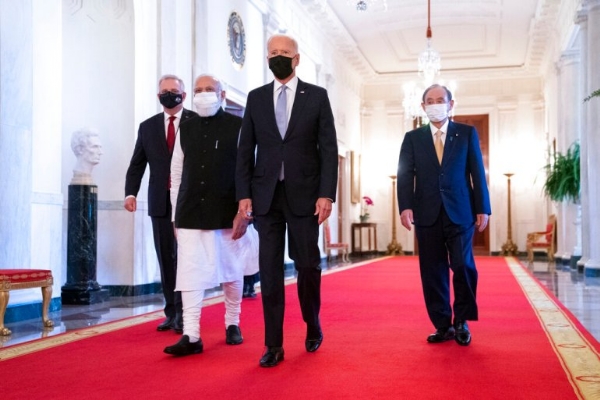QUAD summit: Leader discussed Afghanistan Situation, vow free, open Indo-Pacific
25 Sep 2021 11:03:25
Washington DC, September 25: Amid ongoing geopolitical crisis, and Dragon's growing dominance in the Indo-pacific region, the first in-person meeting of the Quadrilateral Security Dialogue (QUAD) Summit, took place in the White House, Washington DC, on Friday.
The meeting enables the QUAD leaders - PM Narendra Modi, US President Joe Biden, Australian PM Scott Morrison, and Japan’s PM Yoshihide Suga to share views on contemporary issues in the region.

Asserting the need for a free and open Indo-Pacific, leaders of the India, Australia, Japan, and the US pledged to work together and announced a slew of new initiatives to take on common challenges. During the summit leaders of the four countries agreed to cooperate on such fields as COVID-19 vaccines, and clean energy and space.
PM Modi's remark
In his short address, Prime Minister Narendra Modi described the summit as "historic" and said QUAD will work in the role of “force for global good”, adding the four democracies "are working in the interest of humanity."
Modi also praised the role played by President Biden and the United States in tackling the challenges of Covid 19. He underlined the importance of strong and vibrant Indo-US ties for a better world.
Also Read |
PM Modi meets VP Harris, acknowledge Pakistan's role in terrorism, here's all about meet
Modi was the first leader invited by host President Joe Biden to address the first in-person Quad gathering in the East Room of the White House. Modi announced that India will make available 8 million doses of the Johnson and Johnson vaccine by the end of October under the Quad vaccine partnership,
He further proposed a common international traveling protocol involving mutual recognition of the COVID-19 vaccination certificate at Quad leaders. Moreover, he exuded confidence that this cooperation by the four democracies will ensure peace and prosperity in the Indo-Pacific region and the world.
Australian PM Morrison, on the other hand, asserted that the Indo-Pacific should be free from coercion in accordance with international law and sovereign rights must be respected. Japan’s Suga separately expressed the importance of the maiden in-person QUAD meeting and said that the Summit reflects strong ties among four nations, emphasising that the Indo-Pacific should be open and free.
They shared perspectives on the situation in Afghanistan, the emerging challenges in South Asia and Indo-Pacific and reaffirmed their commitment to work together to contain the COVID-19 pandemic and work towards preventing the other pandemics that would come in the future. Evolving a common approach to emerging technologies, cybersecurity, and addressing the challenge of climate change was something that the leaders discussed.
.
.
